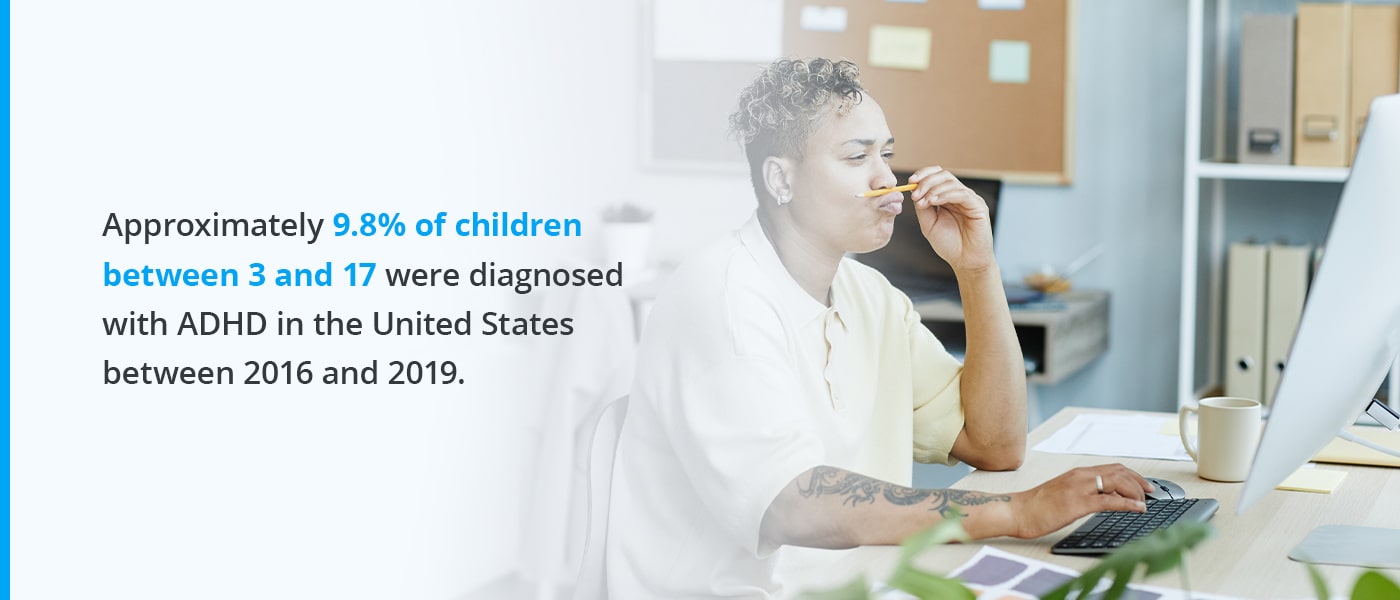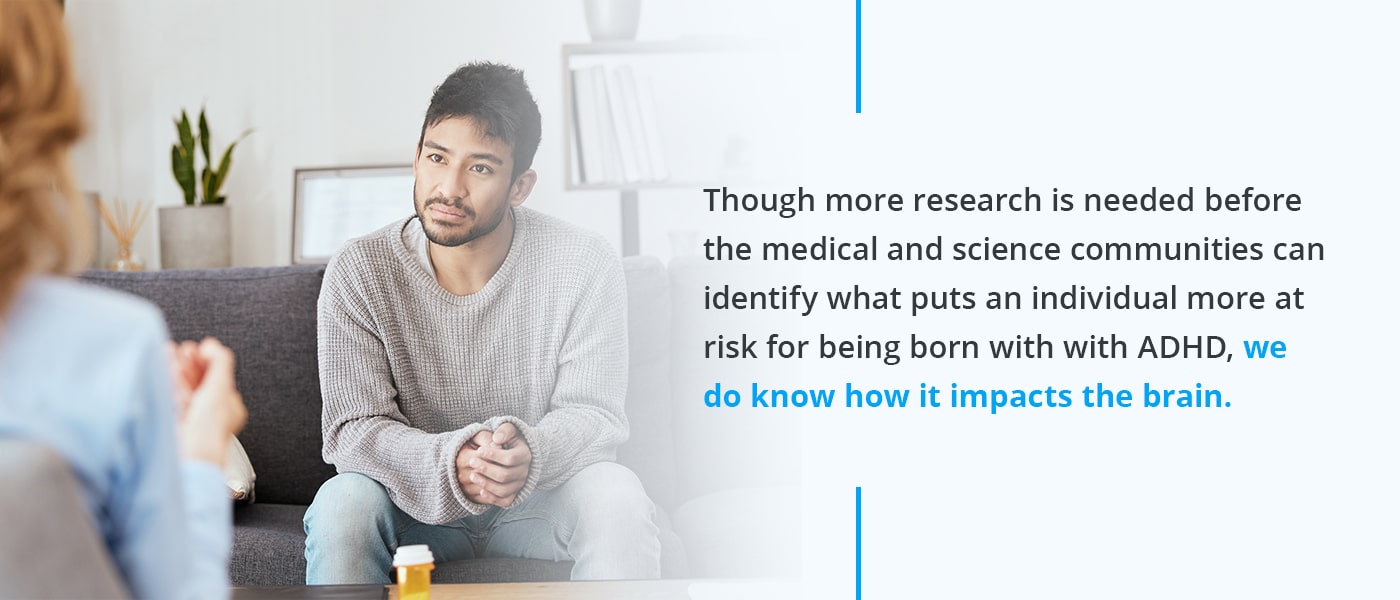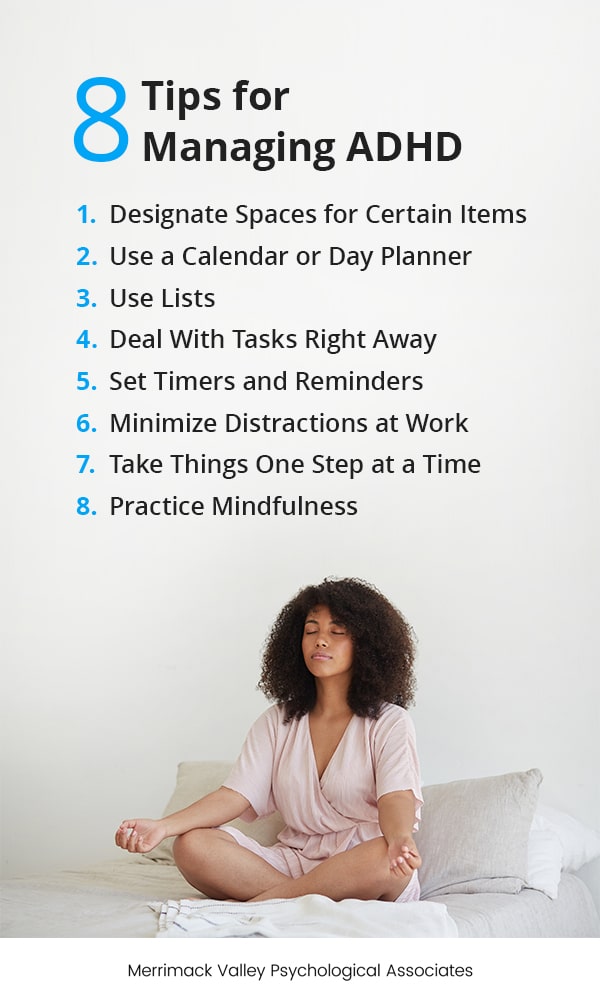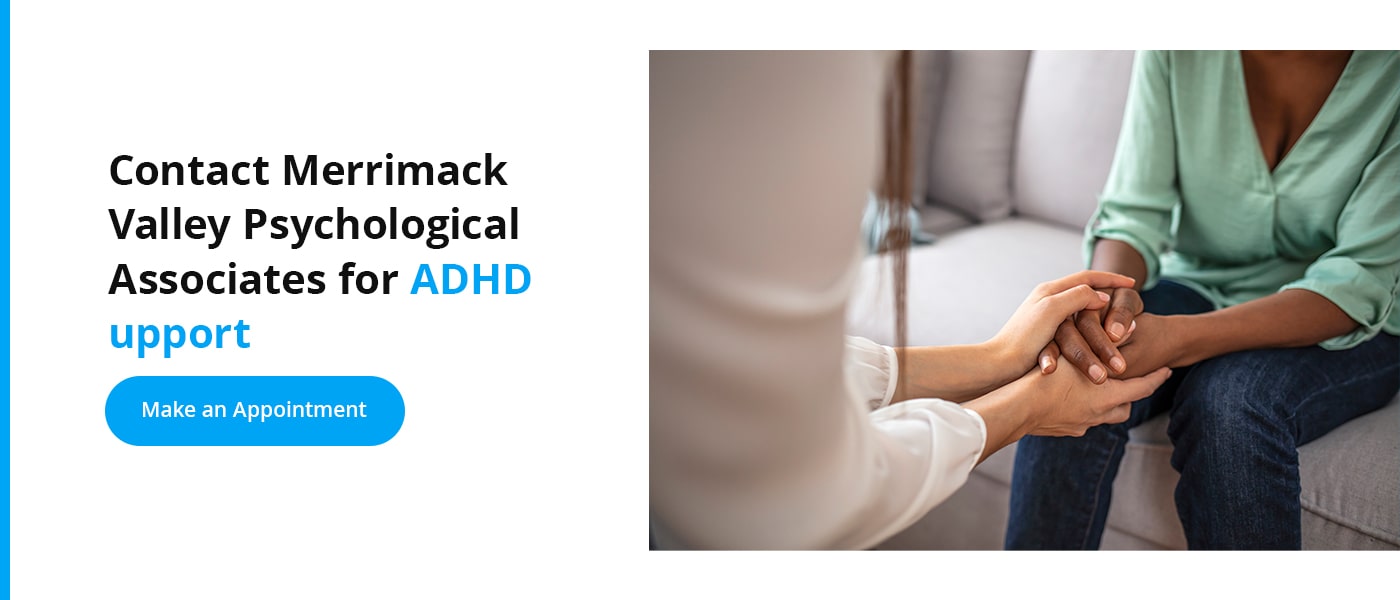Guide to ADHD: Working With Your Brain
If you have attention deficit hyperactivity disorder (ADHD), managing everyday tasks can seem overwhelming. From paying bills on time to keeping up with work and home demands, ADHD can present challenges for kids and adults across all areas of life. Fortunately, there are skills you can learn to help manage symptoms of ADHD.
By putting these tips into practice and approaching them with a positive mindset, you could see improvement in your daily habits, recognize your strengths and learn new ways to work efficiently. Our complete guide to ADHD will outline recommendations to navigate the challenges of living with ADHD so you can feel happier, less stressed and more in control of your life.
What Is ADHD?
ADHD is a condition that leads to impulsivity, hyperactivity and an inability to stay focused, though symptoms vary between individuals. Approximately 9.8% of children between 3 and 17 were diagnosed with ADHD in the United States between 2016 and 2019. ADHD is often diagnosed in childhood, and symptoms persist into adulthood. Recent studies show a 43% increase over a 10-year period in the number of individuals diagnosed in adulthood.
A child or teenager with ADHD might have challenges paying attention in school, following directions, sitting still or regulating their emotions. Adults might struggle to pay bills on time, maintain relationships or stay on top of work tasks.
Some core symptoms of ADHD include:
- Being unable to sit still and/or constantly fidgeting
- The inability to start, complete and/or concentrate on tasks
- Excessive talking and/or a tendency to interrupt conversations
- Acting impulsively
- Proneness to frequent daydreams
- Inattentiveness and distractability
- Difficulty managing time and prioritizing tasks
Medical professionals have classified three known subtypes of ADHD — predominantly inattentive, predominantly hyperactive/impulsive and combined. There is no known cause of ADHD, but genetics are partly responsible.
How ADHD Impacts the Brain
Though more research is needed before the medical and science communities can identify what puts an individual more at risk for being born with with ADHD, we do know how it impacts the brain. ADHD is linked with several cognitive, motivational and behavioral functions, including abilities related to memory, emotional regulation, the capacity for attention and motor activity.
This is due to the various ways ADHD is related to differences in the brain’s structure, function and development, as well as the brain’s complex neurotransmitter network and premotor and prefrontal cortex. Neurons communicate information through the brain, and evidence shows those with ADHD may have slower neuron development and difficulty relaying certain abilities or messages. ADHD brains often have different brain volume associated with the amygdala and hippocampus than non-ADHD brains.
8 Tips for Managing ADHD
The core symptoms of ADHD include inattention and distractibility — making organization one of the most significant challenges adults with the condition face. You might feel overwhelmed by the prospect of maintaining organization at work or home. If you are a parent of a child with ADHD, you might struggle with helping them stay focused at school.
However, by implementing a few of these organization and focus tips for ADHD, you can help set yourself up for success, especially if used as part of a larger ADHD treatment and management plan that may or may not include prescription medications. Consult your doctor to learn what’s right for your or your child’s health and lifestyle.
1. Designate Spaces for Certain Items
Organizing your home space can help your mind feel less cluttered as well. Ask yourself what you need to use daily. Find storage bins or areas of the home where you can place the items you don’t use. Designate space for items like your wallet, keys, bills and other things you can’t misplace. Throw away everything else you don’t need.
2. Use a Calendar or Day Planner
Among the organization tips for ADHD, using a calendar or day planner is often at the top of most lists. It’s a simple way to keep track of work or home tasks and prioritize certain chores you don’t want to forget. For instance, use a calendar on your computer or desk to help remember essential appointments and work deadlines. When you use a smartphone or computer, you can even set up automatic reminders so you don’t forget scheduled events.
Keeping a calendar or planner doesn’t come naturally to many people with ADHD, who might struggle with remembering to fill it in or check it. Many ADHD-friendly planners are available online, but the best one for your is the one you’re most likely to use. Don’t be afraid of some trial and error — if you try to keep a calendar and aren’t successful, keep trying and use new strategies each time until you find what’s most helpful.
Here are some ideas to get you started:
- Make it easy on yourself: Keep your planner in a dedicated place that’s easily accessible and impossible to overlook, like near the coffee pot, in your backpack or by your phone charger. Set aside two time slots each day — one to review what’s on your planner for the day and one to fill out your planner for the next day. Use this time to note any tasks that need finished from yesterday’s to-do list, record progress on large projects and any preparation time required for upcoming events, tests or meetings. Consider linking these time slots with things you already do, like with your morning coffee or while dinner is cooking.
- Maximize your planner: Planners aren’t just for your own to-do lists and appointments — get more out of it by noting all parts of your life that need your attention. Schedule in time slots or days dedicated to spending time with family or socializing with a specific friend. Write down reminders to check in on loved ones or to send a birthday gift.
- Keep things flexible: Understand that it’s OK if plans go awry and you need to reorganize — write it down and keep moving forward. Add plenty of transition time between each item in your planner, and include some extra padding for big events or projects that might take longer than expected.
- Set a reminder: Use the alarm app on your phone to set a reminder to check your planner throughout the day and before the start of every new week and month.
3. Use Lists
Using lists is one of the most crucial organization tips for ADHD. With lists, you can track your regular tasks, deadlines and appointments. If you use a daily planner, keep your notes and lists inside it. If you notice unfinished tasks on your to-do lists, try to determine why. For instance, you might have tried to multitask and get everything done quickly. Or perhaps distractions kept you from completing specific tasks. Use your findings to arrange future lists or find efficient ways to work.
Since many adults and children with ADHD find it challenging to create and manage lists, consider these tips:
- Focus on one to three tasks daily instead of creating long lists that could become overwhelming.
- Write all to-dos as actions. Instead of “homework,” you would write “study for tomorrow’s exam.” Instead of “dishes,” you would write “wash the dishes” or “unload the dishwasher.”
- Never assume you’ll remember an important task or due date — jot it down in your phone or calendar app as soon as you learn it. Add important dates into your phone’s calendar app with an alarm reminder.
- Estimate how much time each task on your list might take, even if you’re unsure, and use that information to make more accurate lists in the future.
- Use doodles, highlighters or stickers to differentiate different tasks.
- Instead of one large list, make several smaller ones. One for your highest priority tasks, one for things that need done but aren’t time-sensitive and one for your daily routine, including those tasks you need to complete regularly throughout the week or month.
- “Stack” habits together to save yourself time and get more done in the day. For example, you could wash a sink full of dishes every morning while your morning coffee brews.
4. Deal With Tasks Right Away
Simplifying your schedule is essential for people with ADHD. Deal with crucial tasks immediately, and don’t start a new project until you’ve completed your current one. Practice saying no to new projects so you can focus on the issue at hand. Order your priorities by the most important projects you need to accomplish until you’ve checked them all off your list. If a task can be completed in two minutes or less, do it right away rather than putting it off.
If you or your child struggle to order priorities, consider the “brain dump” method:”
- Do a “brain dump” by noting all of your tasks and goals on a piece of paper, Google Doc or in an easily accessible app on your phone or tablet. Consider all parts of your life, including your work or school responsibilities, personal health, friends and family and similar.
- Once you’ve gotten all of the information down, go back through each and note it’s due date, if applicable.
- Reorganize your list onto a fresh piece of paper, starting with tasks that have due dates, starting with those due soonest.
Many adults with ADHD might also benefit from approaching to-do lists with the Eisenhower matrix in mind, which categorizes each task into one of four categories — urgent and important, urgent but not important, not urgent but important or not urgent and not important.
5. Set Timers and Reminders
Setting timers and reminders are essential ADHD tips for adults. Forgetting deadlines, appointments or other responsibilities can create problems in your personal life. For help, turn to smartphone apps or computer programs to remind you of these essential tasks. For instance, you might set your phone to alert you 10 minutes before every event in your calendar.
Give yourself specific amounts of time for each task, and have your alarm alert you when the time is up. For longer assignments, consider setting alarms for intervals to keep you aware of how much time has gone by. Set up reminders so you have enough time to prepare for meetings and other events, so you aren’t searching for your wallet or key when it’s time to leave.
6. Minimize Distractions at Work
Distractions can be a considerable challenge for people with ADHD. Minimize work distractions with these focus tips for ADHD:
- Keep things clutter-free: Keep your desk free of clutter by scheduling a time each day to throw away trash, reorganize supplies or file documents. Apply the same method to your computer or other work-related devices.
- Avoid unnecessary smartphone usage: Only check your phone or email at set times during the day. Many smartphones have a usage timer to let you know how long you’ve been on your phone and when you reach your set limit. Let a voicemail pick up your phone calls or turn notifications off at set times.
- Ask for accommodations: Ask for a quiet office or area at work to minimize distractions caused by other people and sounds.
- Use tools and accessories: Use noise-canceling headphones or a white noise machine to cover other sounds at work.
7. Take Things One Step at a Time
When you have many responsibilities on your plate, it can be overwhelming knowing where to start. Break up bigger tasks into smaller ones and brainstorm ways to make each task more engaging and rewarding to help you stay motivated.
A parent’s guide to ADHD will likely include this tip since it can help your child make school projects more manageable. Adults with ADHD might take a break between tasks or take notes during meetings to keep their minds active.
8. Practice Mindfulness
To reduce stress and help you control attention and impulses, practice mindfulness. Meditation, deep breathing techniques and other mindfulness activities can help you resist distractions and develop skills to help regulate your emotions. One way to practice mindfulness is the Pause and Plan with the 4-7-8 technique. Breathe deeply through your nose for four seconds, hold for seven and slowly release through the mouth for eight seconds.
Contact Merrimack Valley Psychological Associates for ADHD Support
If you are living with ADHD, everyday tasks and responsibilities can often feel beyond your control. Whether you’re looking for ways to manage ADHD symptoms or a parent’s guide to ADHD, contact MV Psych for support.
If you or your child is struggling with ADHD, we encourage you to contact us today. We offer a personalized approach for those facing challenges related to ADHD and other conditions, and we can provide therapy and ADHD tips to help you or your child feel more confident and productive.





